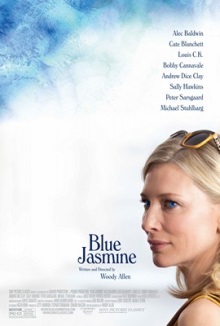
I don’t consider myself a fan of Woody Allen’s films. Sure, there is much to admire about them including the clever dialogue and witty social commentary, but on the whole, they’re not to my taste. Blue Jasmine gained attention recently both for being one of the better Allen films of recent years and one that departs significantly from his usual form. Since this film also won Cate Blanchett the Best Actress Oscar, I thought I should check it out.
The events depicted in Blue Jasmine are most obviously based on the Bernard Madoff scandal, but thematically it bears strong similarities with A Streetcar Named Desire. Blanchett’s Jasmine is forced to move in with her working-class sister after her billionaire husband’s investment company is revealed to be a massive scam. This upsets the relationship between her sister, who has long been overshadowed by the more glamorous Jasmine, and her boorish fiancé.
Watching the spoiled Jasmine brought down to earth to live as common mortals do is undeniably satisfying, especially since the film interleaves scenes of her present penury with those of her living in the lap of luxury and behaving as if this was her natural due. But our schadenfreude is tempered by the observation that Jasmine’s fall from grace has left her mind unbalanced. The audience’s contempt of the undeserving rich is therefore set to war with our sympathy for the mentally ill.
Blanchett naturally is the star of the show and plays Jasmine with aplomb. Her poise and elegance at the height of her powers is impressive but both my wife and I agree that she overdoes the mania when her expectations run headlong into reality. I find myself looking back at A Streetcar Named Desire and admiring how the film slowly traces Blanche DuBois’ descent into madness with the nervous breakdown as the natural climax. Here it is clear to the audience from the beginning that Jasmine is crazy and she essentially remains crazy for the entire film. In fact, the character barely has any development at all. The moment she steps off the plane, her interactions with her sister are about what we’d all expect in the most stereotypical fashion, with no surprises or flashes of deep insight into her psyche.
I also find myself disappointed that while the issues touched upon here, the outsized earnings of the financial industry, the 1%, inequality etc., are very relevant in the US today, Woody Allen doesn’t seem to have anything interesting or insightful or say about them. Usually he appears in his own films and provides the required critiques himself. But as he doesn’t appear in this one, and no one takes his place as the authorial voice, the issues aren’t really talked about at all. They’re just part of the background.
Looking through older posts on Broken Forum, I find that the posters there, people whose opinion I usually value highly, generally liked this film very much. So I find it odd that I merely feel lukewarm about it. Perhaps there are elements in this film which speak more strongly to Americans given all of the events that they have lived through following the 2008 financial crisis. If I may speak uncharitably, perhaps they enjoy watching a 1-percenter brought low more than I do.
Whatever the case, I think this film is merely slightly above average. Even bereft of his wit and critique, Allen’s dialogue remains well-written. The performances are solid. The premise is sound. But the film shies away from really taking on the issues head on and the most dramatic moments of Jasmine’s story take place before this film starts. What we see here is merely the long drawn-out fallout.